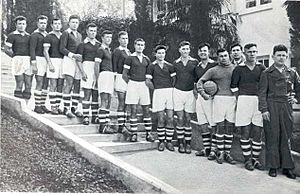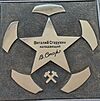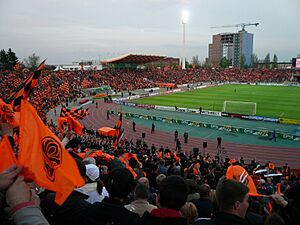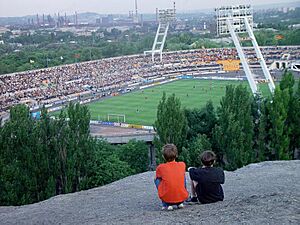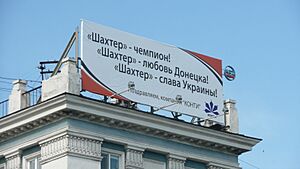FC Shakhtar Donetsk facts for kids
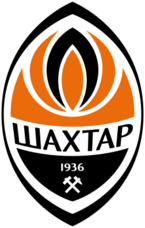 |
|||
| Full name | Футбольний клуб «Шахтар» Донецьк Football Club Shakhtar Donetsk |
||
|---|---|---|---|
| Nickname(s) | Hirnyky (Miners) Kroty (Moles) |
||
| Founded | 24 May 1936 | ||
| Ground | Arena Lviv, Lviv Oblast Veltins Arena, Gelsenkirchen (European cups) |
||
| Capacity | 34,915 | ||
| Owner | Rinat Akhmetov | ||
| General Director | Serhiy Palkin | ||
| Head coach | Arda Turan | ||
| League | Ukrainian Premier League | ||
| 2024–25 | Ukrainian Premier League, 3rd of 16 | ||
|
|
|||
Football Club Shakhtar Donetsk is a professional football team from Ukraine. It was originally based in the city of Donetsk. However, because of the war in Donbas that started in 2014, the club had to move. They played matches in Lviv (2014–2016) and Kharkiv (2017–2020). Their main office and training facilities are in Kyiv. Since May 2020, Shakhtar has played home matches at NSC Olimpiyskyi in Kyiv. For the 2023–24 season, they returned to Arena Lviv for home games.
Shakhtar often plays in big European competitions like the UEFA Champions League. In 2009, they made history by winning the UEFA Cup. This was before the competition changed its name to the Europa League. Shakhtar Donetsk is one of only two Ukrainian clubs to win a major UEFA competition. The other club is Dynamo Kyiv.
The club used to play its home games in Donetsk at the Donbas Arena. But because of the Russo-Ukrainian War in 2014, they had to move about 1000 kilometers west to Arena Lviv. Later, in early 2017, they moved again to the Metalist Stadium in Kharkiv, which is about 250 kilometers northwest of Donetsk. From May to July 2020, Shakhtar played home matches at NSC Olimpiyskyi in Kyiv.
Shakhtar Donetsk is one of Ukraine's most popular football clubs. It is especially loved in the eastern Donbas region. In October 2021, Shakhtar had 1.4 million followers on Facebook, which was the most in Ukraine. The club is one of the oldest in Ukraine, with a history going back to the start of Soviet football.
Contents
Club History: From Miners to Champions
How the Club Got Its Name
The team has had a few names over the years. It was called Stakhanovets from 1936 to 1946. Then it became Shakhtyor (Shakhtar) from 1946 to 1992. Since 1992, it has been known as FC Shakhtar.
The name "Shakhtar" is very important to the club's roots. It means "coal miner" in Ukrainian. This name connects to the Donets Basin region, which is famous for its underground coal mining. In 1936, local football teams joined together to represent the mining community. They were part of a sports group called Stakhanovets. This name came from Alexei Stakhanov, a famous coal miner.
After World War II, the club changed its name to Shakhtyor, which means "miner." This name stuck because mining was a very important job in the Soviet Union. When Ukraine became independent, the club officially used its Ukrainian name, Шахтар Донецьк, or Shakhtar Donetsk in English.
Early Years: Building the Team
The Shakhtar club started on April 3, 1936. It was first called Stakhanovets. This name honored the Stakhanovite movement, which encouraged workers to produce more. The first team was made up of players from two local teams, Dynamo Horlivka and Dynamo Stalino.
Their very first game was on May 12, 1936, against Dynamo Odesa. They lost 3–2. Their first league game was on May 24, 1936, against Dynamo Kazan, which they lost 4–1. Even with these early losses, the team worked hard and became strong by the end of the 1930s.
During the 1941 "war championship," which was stopped suddenly, Shakhtar even beat the Soviet champions, Dynamo Moscow. Many players went to fight in the war and sadly did not return.
In July 1946, the club changed its name to Shakhtyor. This name, meaning "miner," showed their connection to the coal mining region. In 1951, Shakhtar achieved third place in the USSR Championship. A key player was Aleksandr Ponomarev, who was named Ukrainian Footballer of the Year. After a brief relegation, Ponomarev became the coach and led Shakhtar back to the top league in 1954.
Cup Wins and Becoming a Strong Team
In the 1960s, under coach Oleg Oshenkov, Shakhtar became known as "The Cup Team." They reached the USSR Cup final three times and won it twice, in 1961 and 1962.
From the mid-1970s to the early 1980s, Shakhtar had even more success. In 1975, they finished second in the USSR Championship. In 1979, the team finished second again, and their captain, Vitaliy Starukhin, was the top scorer with 26 goals. He was also named Soviet Footballer of the Year.
Shakhtar won the Soviet Cup twice more, in 1980 and 1983. In 1983, they also won the Soviet Super Cup against Dnipro Dnipropetrovsk. They even reached the quarter-finals of a European competition, the 1983–84 European Cup Winners' Cup.
New Era in Independent Ukraine
After Ukraine became independent, Shakhtar became a top team, often competing with Dynamo Kyiv. In October 1995, the club's president, Akhat Bragin, passed away in a bombing. In 1996, Rinat Akhmetov became the new president and invested a lot of money into the club.
Shakhtar won the Ukrainian Cup three times in this period: in 1995, 1997, and 2001. In 1999, the Shakhtar football academy opened. It now trains about 3,000 young players. In 2000, Andriy Vorobey was named Ukrainian Footballer of the Year. That same year, Shakhtar played in the UEFA Champions League for the first time.
First League Title and European Success
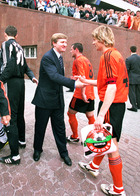
Shakhtar won its first ever Ukrainian Premier League title in the 2001–02 season under coach Nevio Scala. They also won the 2001–02 Ukrainian Cup that year. Key players included captain Anatoliy Tymoshchuk and striker Andriy Vorobey. Tymoshchuk was named Ukrainian Footballer of the Year.
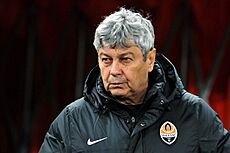
In 2004, Mircea Lucescu became the manager. He quickly led the team to win the 2003–04 Ukrainian Cup. He also helped them reach the UEFA Champions League group stage for the first time. Lucescu's strategy was to find young, talented players from Brazil for the attack, while using Ukrainian players for defense. This led to Shakhtar being called "the most Brazilian club in Europe."
They won the Premier League again in 2005 and 2006. In 2006, they won their first Ukrainian Super Cup. In 2008, Shakhtar won the Premier League and the 2007–08 Ukrainian Cup.
UEFA Cup Victory and Dominance
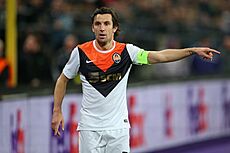
In 2009, Shakhtar achieved a huge milestone. They became only the second Ukrainian team to win a European competition. They won the UEFA Cup by beating Werder Bremen 2–1 in the final. This was the last time the UEFA Cup was played before it became the Europa League.
Shakhtar continued to dominate in Ukraine. They won the Premier League in 2010. The 2010–11 season was very successful. They reached the quarter-finals of the Champions League, their best performance at that time. They also won the Premier League, Ukrainian Cup, and Super Cup, completing a "domestic treble."
They won the Premier League and Ukrainian Cup again in the 2011–12 season. Key players included captain Darijo Srna, defender Yaroslav Rakitskyi, and Brazilian midfielders Fernandinho and Willian.
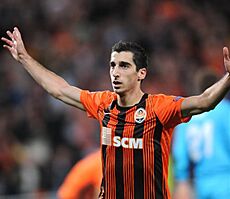
In the 2012–13 season, Shakhtar won the Premier League, Cup, and Super Cup. Henrikh Mkhitaryan was the top scorer in the league, setting a record with 25 goals. He was also named the best player in the Ukrainian Premier League.
Challenges and Continued Success
Before the 2013–14 season, many key players like Henrikh Mkhitaryan, Fernandinho, and Willian were sold for large amounts of money. Shakhtar brought in new young players to rebuild the team. Even with these changes, Shakhtar won the Ukrainian Premier League in 2013–14 and the Ukrainian Super Cup in 2014.
Because of the war in Donbas, Shakhtar had to move their home games to Arena Lviv starting in 2014. This meant fewer fans could attend. In the 2014–15 UEFA Champions League, striker Luiz Adriano scored five goals in one Champions League match, matching a record set by Lionel Messi. Shakhtar finished second in the league that season.
In the 2015–16 Ukrainian Premier League, Shakhtar beat Dynamo Kyiv 3–0 in Kyiv, setting new records for the "Klasychne derby." Later that season, Alex Teixeira moved to a Chinese club for a record fee. After the 2015–16 season, long-time manager Mircea Lucescu left, and Paulo Fonseca took over.
Under Fonseca, Shakhtar won the league, cup, and supercup in the 2016–17 season. They moved their home games to Metalist Stadium in Kharkiv. They continued to win the league and cup in 2017–18 and 2018–19. In 2019–20, Shakhtar won their fourth league title in a row and reached the semi-finals of the 2019–20 UEFA Europa League.
Club Facilities
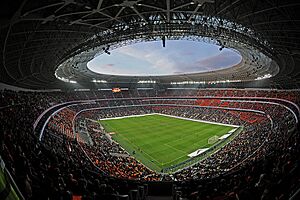
Until 2009, Shakhtar played most of its games at the RSC Olimpiyskyi stadium in Donetsk. This stadium was built during the Soviet era.
On August 29, 2009, Shakhtar opened its new stadium, the Donbas Arena. It is located in the City Park of Culture and Recreation. This stadium can hold 50,149 people and received a UEFA five-star rating, which is the highest possible.
Shakhtar's old home, the central Shakhtar Stadium, built in 1936, is now used by the club's reserve teams. The stadium was updated in 2000.
The club's mascot is a mole, which is also a nickname for the team. Shakhtar is known for having many fans attend their games. Before the 2013–14 season, they sold 27,000 season tickets, a record for Eastern Europe.
From 2014 to 2016, because of the war, Shakhtar played home matches at the Arena Lviv. After the winter break of the 2016–17 season, the club moved to the Metalist Stadium in Kharkiv. For their European matches in 2022–23, Shakhtar played in Warsaw, Poland. For the 2023–24 UEFA Champions League, they played in Hamburg, Germany.
Training Centre
Shakhtar Donetsk has its own training facilities for its main team, reserve team, and youth academy. These are all located at the Kirsha Training Centre.
Due to the ongoing war, Shakhtar's training facilities are now in Kyiv. They use the "Sviatoshyn" training base, which is about 20 miles from Kyiv.
Youth Teams and Academy
The club used to have several reserve teams that played professionally. By 2015, these teams were no longer in professional competitions. However, the club still has a youth team, Shakhtar U-21, that plays in the Ukrainian Premier League youth championship. Shakhtar also has a football academy with four teams for teenagers. Since 2012, they also have a team for the U-19 championship.
During Soviet times, the club had a youth team called Shakhter-D Donetsk. Because of the 2022 invasion of Ukraine, the youth academy has moved to Split, Croatia.
Team Look: Crests and Colours
The first club logo in 1936 was a blue hexagon with a red 'S' and a jackhammer. In 1946, the logo changed to black and white, adding the club's name. In the mid-1960s, the logo showed two crossed hammers with "Shakhtar Donetsk" in a circle. This crest was added to the team's kit and has stayed there, except for a few seasons in the early 1990s.
In 2007, a new logo was revealed. For the first time in over 30 years, the crossed hammers, which are traditional symbols of the club, were back on the crest. Also, for the first time, the club's name was written in Ukrainian, not Russian.
Since 1961, Shakhtar's official colors have been black and orange.
Kit Suppliers and Sponsors
| Period | Kit manufacturer | Shirt sponsor |
|---|---|---|
| 1992–98 | Adidas | Carlsberg |
| 1998–05 | DCC | |
| 2005–06 | Lifecell | |
| 2006–07 | SCM | |
| 2008–21 | Nike | |
| 2021– | Puma |
Fans and Rivalries
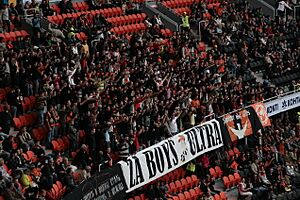
Shakhtar fans have a long history. In 1959, some fans ran onto the field during a match against CSKA Moscow. In the early 2000s, fan culture grew, sometimes leading to clashes. For example, in 2003, there was a big fight between fans of Dynamo and Shakhtar during the Ukrainian Cup final.
Another rivalry was with Metalurh Donetsk, a local club. Their games were called the Donetsk derby. However, Metalurh stopped playing in 2015.
In the past, Shakhtar also had rivalries with Spartak Moscow and Dinamo Tbilisi from Georgia during Soviet times. The "Donbas Derby" with Zorya Luhansk also drew large crowds.
Club Achievements
Ukrainian Competitions
- Ukrainian Premier League
- Winners (15): 2001–02, 2004–05, 2005–06, 2007–08, 2009–10, 2010–11, 2011–12, 2012–13, 2013–14, 2016–17, 2017–18, 2018–19, 2019–20, 2022–23, 2023–24
- Runner-up (13): 1993–94, 1996–97, 1997–98, 1998–99, 1999–2000, 2000–01, 2002–03, 2003–04, 2006–07, 2008–09, 2014–15, 2015–16, 2020–21
- Ukrainian Cup
- Winners (15, record): 1994–95, 1996–97, 2000–01, 2001–02, 2003–04, 2007–08, 2010–11, 2011–12, 2012–13, 2015–16, 2016–17, 2017–18, 2018–19, 2023–24, 2024–25
- Runner-up (6): 2002–03, 2004–05, 2006–07, 2008–09, 2013–14, 2014–15
- Ukrainian Super Cup
- Winners (9, record): 2005, 2008, 2010, 2012, 2013, 2014, 2015, 2017, 2021
- Runner-up (8): 2004, 2006, 2007, 2011, 2016, 2018, 2019, 2020
European Competitions
- UEFA Cup
- Winners (1): 2008–09
- UEFA Super Cup
- Runner-up (1): 2009
Soviet Competitions
- Soviet Top League
- Runner-up (2): 1975, 1979
- Soviet Cup
- Winners (4): 1961, 1962, 1980, 1983
- Runner-up (4): 1963, 1978, 1985, 1986
- Soviet First League
- Winners (1): 1954
- Runner-up (1): 1972
- Season's Cup (unofficial tournament as Super Cup)
- Winners (1): 1984
- Runner-up (2): 1981,1986
- Cup of the Ukrainian SSR
- Runner-up (1): 1972
Friendly Competitions
- Channel One Cup: 2006
- La Manga Cup: 2008
- Uhrencup: 2009
- Copa del Sol: 2010, 2013
- Salzburgerland Cup: 2011
- United Tournament/United Supercup: 2014
- Trofeo Bortolotti: 2015
- IFA Shield (IFA) runners-up: 1985
Team Awards
- Special award from the IFFHS for making the biggest progress of the decade, 2011.
Individual Player Awards
Many players have won special awards while playing for Shakhtar Donetsk.
Soviet Footballer of the Year
Footballer of the Year in Baltic and Commonwealth of Independent States
 Henrikh Mkhitaryan (2012)
Henrikh Mkhitaryan (2012)
Ukrainian Footballer of the Year
 Viktor Fomin (1950)
Viktor Fomin (1950) Aleksandr Ponomarev (1951)
Aleksandr Ponomarev (1951) Vitaliy Starukhin (1979)
Vitaliy Starukhin (1979) Anatoliy Tymoshchuk (2002, 2006, 2007)
Anatoliy Tymoshchuk (2002, 2006, 2007) Mykhailo Mudryk (2022)
Mykhailo Mudryk (2022)
Ukraine Premier League MVP
- As awarded by the Komanda newspaper
 Andriy Vorobey (2000)
Andriy Vorobey (2000) Anatoliy Tymoshchuk (2002)
Anatoliy Tymoshchuk (2002) Andriy Pyatov (2010)
Andriy Pyatov (2010) Henrikh Mkhitaryan (2012)
Henrikh Mkhitaryan (2012) Alex Teixeira (2015)
Alex Teixeira (2015)
 Marlos (2016–18)
Marlos (2016–18) Taison (2019)
Taison (2019)
Armenian Footballer of the Year
 Henrikh Mkhitaryan (2011, 2012)
Henrikh Mkhitaryan (2011, 2012)
Polish Footballer of the Year
Soviet Goalkeeper of the Year
Club Loyalty Award
Romania Coach of the Year
 Mircea Lucescu (2004, 2010, 2012, 2014)
Mircea Lucescu (2004, 2010, 2012, 2014)
Current Players
First Team Squad
|
|
Other Players Under Contract
|
|
Players Out on Loan
|
|
Retired Numbers
| No. | Player | Nationality | Position | Shakhtar debut | Last match | Ref |
|---|---|---|---|---|---|---|
| 33 | Darijo Srna | Right back | 12 July 2003 | 13 September 2017 |
Club Leadership
Coaches and Administration
| Administration | Coaching (senior team) | Coaching (U-19 team) |
|---|---|---|
|
|
Presidents
- 1989–1994: Ivan Haivoronskyi
- 1992–1995: Akhat Bragin
- 1996–present: Rinat Akhmetov
Chairmen of the Board
- 1990–1992: Oleksandr Kosevych (chair of the board)
- 2006–present: Oleh Popov (chair of council of directors)
Vice Presidents
- 1994–1995: Ivan Haivoronskyi
- 1994–2000: Ravil Safiullin
- 1998–present: Borys Kolesnikov
General Directors
- 2004–present: Serhiy Palkin (financial director in 2003–2004)
Director of Football
- 2020–present:
 Darijo Srna
Darijo Srna
Player Records
Top Goalscorers
As of 21 May 2016
| # | Name | Years | League | Cup | Europe | Other | Total |
|---|---|---|---|---|---|---|---|
| 1 | 2007–2015 | 77 | 16 | 32 | 3 | 128 | |
| 2 | 1998–2007 | 80 | 22 | 12 | 0 | 114 | |
| 3 | 1973–1981 | 84 | 23 | 3 | 0 | 110 | |
| 4 | 1974–1987 | 87 | 11 | 5 | 2 | 105 | |
| 5 | 2002–2008 | 65 | 11 | 15 | 0 | 91 | |
| 6 | 2010–2016 | 67 | 10 | 12 | 0 | 89 | |
| 7 | 1982–1991 1994–1996 1998 |
70 | 12 | 2 | 0 | 84 | |
| 8 | 1990–1995 1996–1997 2000–2002 |
61 | 9 | 12 | 0 | 82 | |
| 9 | 1980–1981 1982–1990 1994 |
65 | 10 | 5 | 0 | 80 | |
| 10 | 1992–1995 1996–2000 |
61 | 16 | 1 | 0 | 78 |
- Other – National Super Cup
Most Appearances
| # | Name | Years | League | Cup | Europe | Other | Total |
|---|---|---|---|---|---|---|---|
| 1 | 2003–2018 | 339 | 48 | 137 | 12 | 536 | |
| 2 | 1974–1987 | 400 | 63 | 18 | 4 | 485 | |
| 3 | 2007–2023 | 301 | 39 | 131 | 11 | 482 | |
| 4 | 1982–1995 | 384 | 51 | 8 | 1 | 444 | |
| 5 | 2010– | 260 | 31 | 91 | 11 | 393 | |
| 6 | 1967–1983 | 321 | 47 | 10 | 0 | 378 | |
| 7 | 1991–2008 | 267 | 56 | 24 | 0 | 347 | |
| 8 | 1974–1986 | 277 | 44 | 16 | 3 | 340 | |
| 9 | 1966–1978 | 297 | 32 | 8 | 0 | 337 | |
| 10 | 1980–1981 1982–1990 1994 |
282 | 40 | 6 | 3 | 331 |
- Other – National Super Cup
Notable Coaches
| Years | Name | Trophies |
|---|---|---|
| 1952–56 | 1 Soviet First League | |
| 1960–69 | 2 Soviet Cup | |
| 1979–85 | 2 Soviet Cup 1 USSR Super Cup |
|
| 1995 | 1 Ukrainian Cup | |
| 1 August 1996 – 30 March 1999 | 1 Ukrainian Cup | |
| 30 November 1999 – 12 October 2001 | 1 Ukrainian Cup | |
| 1 January 2002 – 18 September 2002 | 1 Ukrainian Premier League 1 Ukrainian Cup |
|
| 17 May 2004 – 21 May 2016 | 8 Ukrainian Premier League 6 Ukrainian Cup 7 Ukrainian Super Cup 1 UEFA Cup |
|
| 31 May 2016 – 11 June 2019 | 3 Ukrainian Premier League 3 Ukrainian Cup 1 Ukrainian Super Cup |
|
| 12 June 2019 – 12 May 2021 | 1 Ukrainian Premier League | |
| 22 September 2021 – 11 July 2022 | 1 Ukrainian Super Cup | |
| 14 July 2022 – 8 June 2023 | 1 Ukrainian Premier League | |
| 3 July 2023 - 16 October 2023 | ||
| 24 October 2023 – 24 May 2025 | 1 Ukrainian Premier League 1 Ukrainian Cup |
League and Cup History
| Tier | Years | Last | Promotions | Relegations |
|---|---|---|---|---|
| Top League (tier 1) | 44 | 1991 | 5 times to Europe | |
| First League (tier 2) | 7 | 1972 | never | |
| Group V (tier 3) | 3 | 1937 | never | |
| 56 years of professional football in Soviet Union since 1936 | ||||
| Tier | Years | Last | Promotions | Relegations |
|---|---|---|---|---|
| Premier League (tier 1) | 33 | 2023–24 | 28 times to Europe | never |
| 33 years of professional national football in Ukraine since 1992 | ||||
Soviet Union League Performance


Ukraine League Performance

European Competition History
Shakhtar Donetsk has played in European competitions since 1976. Their first game was against Berliner FC Dynamo in the UEFA Cup. Since 1997, the club has played in UEFA competitions every year. They first joined the UEFA Champions League in 2000. In the 2000–01 season, they played against Arsenal, Lazio, and Sparta Prague in the group stage.
| Season | Achievement | Notes | |
|---|---|---|---|
| European Cup / UEFA Champions League | |||
| 2010–11 | Quarter-finals | eliminated by |
|
| UEFA Cup / UEFA Europa League | |||
| 2008–09 | Winners | defeated |
|
| 2015–16 | Semi-finals | eliminated by |
|
| 2019–20 | Semi-finals | eliminated by |
|
| UEFA Cup Winners' Cup | |||
| 1983–84 | Quarter-finals | eliminated by |
|
| UEFA Super Cup | |||
| 2009 | Runners-up | defeated by |
|
See also
 In Spanish: FK Shajtar Donetsk para niños
In Spanish: FK Shajtar Donetsk para niños
 | Misty Copeland |
 | Raven Wilkinson |
 | Debra Austin |
 | Aesha Ash |


